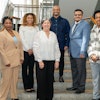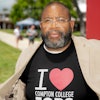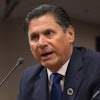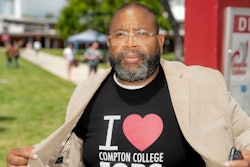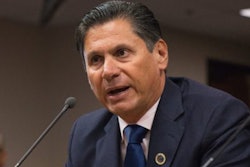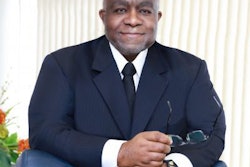For Dr. Steven R. Gonzales, education is a lifelong calling. Despite other opportunities available to him, he decided to pursue a degree in mathematics secondary education. He returned in 1996 to Coolidge High School in Coolidge, Arizona — the school he graduated from a few years earlier — to serve as a math teacher. The rest is history. Gonzales’ passion for education has culminated in a swift rise to being named chancellor of the Maricopa County Community College District (MCCCD) last September. The district comprises 10 independently accredited colleges in Arizona serving over 94,000 students.
In recognition of his commitment to inclusive excellence, servant leadership, and his devotion to lifting up the disenfranchised in the community college space, Gonzales has been named a 2023 recipient of the Diverse Champions Award.
A passion for education
 Dr. Steven R. Gonzales (center), chancellor of the Maricopa County Community College District, is credited as being a leader who listens to and incorporates multiple perspectives before arriving at decisions.
Dr. Steven R. Gonzales (center), chancellor of the Maricopa County Community College District, is credited as being a leader who listens to and incorporates multiple perspectives before arriving at decisions.
Gonzales said education “was something that I realized quickly that I felt like I was born to do in many ways. I just really like being around students, especially the extracurricular part of education.”
After two years at Coolidge, Gonzales went on to teach at Central Arizona College, where he spent 15 years rising through the ranks to become interim associate vice president of academic affairs. Gonzales said he did not necessarily aspire to be a higher ed administrator at that point, but it became a natural extension of his core passion for education.
“I can’t necessarily say that it was something I ever aspired to do,” said Gonzales of being a college administrator. “I just found myself in positions of wanting to expand my reach of the types of decisions that I think I could make that could impact students that I was hoping to impact.”
Gonzales said that while at Central Arizona College (CAC), he was encouraged by Dr. Terry Calaway, who was serving as president of CAC at the time, to enroll in the Community College Leadership Program at the University of Texas at Austin. There, Gonzales earned an Ed.D. in 2007. He became president of GateWay Community College in MCCCD in 2013. In January 2020, he began serving as interim chancellor of MCCCD and was initially told that he would likely be in that role for six months until a permanent chancellor was named. He was only in office a couple months when the COVID-19 pandemic hit and the MCCCD Governing Board took notice of how he deftly handled the interim position.
“I took the advice that I give anyone who ever steps into an interim role that just says, if you ever think you want the job, your interview started the day that you started the interim position,” he said. “But more importantly, I don’t know what interim really means.”
Gonzales said he went on a six-week listening tour of MCCCD institutions, getting to nine before the pandemic hit, which he said gave him the opportunity to talk about how issues raised during the tour would be addressed before a new chancellor would be named.
Gonzales was not a candidate for the permanent chancellorship initially and had to field continual questions about the future of MCCCD and the status of the chancellor search. But as the pandemic raged on and upended life for MCCCD students and faculty, Gonzales endeavored to stay focused on them.
“I don’t have time to focus on what our governing board is planning on doing or going to do with the search,” he said. “But I do know that every day I wake up, I’m the interim chancellor and we have 150,000 students that are waiting for us to make decisions to ensure that we have … continuity of services.”
The MCCCD Governing Board took notice.
“The more and more I began to work with him, the more I began to see that he had very invested interests in people building,” said MCCCD Governing Board President Marie Sullivan. Gonzales “is one of the finest people I know.”
“He works hard to ensure that he is living values of integrity, inclusiveness, collaboration in his work every day,” Sullivan continued. “It’s been a journey together. It’s also been my honor to work with him. I believe he has made my job as board chair easier, just like I hope I have made his job as chancellor easier.”
A focus on people
Gonzales’ focus on people and making personal contact with everyone within the institutions he has led, irrespective of title and rank, is what stands out, according to those who know him well.
“He’s very heartwarming,” said Frank Zamora, a recently retired division chair and faculty member at GateWay Community College. “He pays attention. I know, he’s the chancellor, but he’s grounded, unlike any other chancellor I’ve seen. He’s grounded and he just truly cares. He cares for success, not just for students, I think he cares for the success of his employees."
The genuine interest Gonzales has in the welfare of those in organizations he has led is evident and has paid dividends as those who work for him say they appreciate working for a leader who cares about their personal and professional welfare.
“I think he appreciates the role that everybody plays and gives everyone an opportunity to opine, to add value, to speak their mind or to provide suggestions,” said Darcy Renfro, vice chancellor for community, government relations, & economic development at MCCCD.
“It’s worked well for us. The inclusiveness has been really helpful,” continued Renfro. “It’s really sent a message to the rest of us leaders here that we need to be more inclusive, we need to be better listeners. That’s what I take from him.”
Dr. Rey Rivera, president of Estrella Mountain Community College in the MCCCD, immediately found a kinship with Gonzales. Both are first-generation college students, grew up in migrant farming communities, have a background in mathematics, and served as president of MCCCD institutions (before Gonzales became chancellor of MCCCD). Rivera also notes Gonzales’ collaborative style.
“People would bring these multiple perspectives into the room, and I think his leadership just lends itself to like, ‘Okay, we’re going to listen to you. We may not all agree at the end of the day, at the end of the meeting, but at least we’re going to listen and try to incorporate your input into the final decision,” Rivera said. “I think having seen that replicated through his leadership throughout the beginning of the pandemic, I think what people saw was, yeah, he’s walking this walk and he’s talking about listening, he’s talking about looking at multiple perspectives, looking at different ideas, looking at creative innovation.”
Renfro said Gonzales’ collaborative style has helped him to navigate the complicated politics of conservative-leaning Arizona. Gonzales “is extremely popular with politicians, and I think that’s because they read his earnestness… He’s a quiet listener, worker and quiet leader, and he comes off so genuine because I think he really is genuine,” Renfro said.
Gonzales has “a heart of gold and you know he actually cares about you when you’re talking to him,” said Renfro. “Part of it is his background and I think what he’s learned is he can be successful and be successful in an inclusive way and not in an exclusive way.”
Sullivan challenges those who may believe Gonzales’ collaborative style means that he cannot still be a decisive leader when necessary. However, beyond simply making decisions as part of his job, Gonzales “wants to listen. He wants to hear people’s point of view. He wants to accept the challenge of maybe by listening he might have to recalibrate,” Sullivan said. Gonzales “is successful because he does go to people, doesn’t expect them always to come to him. I think that reaching out is another example, both of respect and collaboration. But the center is always people and relationships. That’s where … good decisions come from.”
A first-generation perspective
A key to Gonzales’ success is that he is a first-generation student and he sees himself in the vast numbers of first-generation and underprivileged students he serves. He said his experience as a first-generation student has “always helped me be a better professor, better administrator, and a better chancellor today. I can relate to some of those fears and unknowns as a first-generation student when you just don’t know what you don’t know.
“And so when I began to share my story and some of the fears that I had and some of the questions I had and some of the mistakes that I made, you see a lot of heads shaking” continued Gonzales. “And they’ll come up afterward and say, ‘Thank you. Because I had no idea. I thought maybe something was wrong with me.’ And I said, ‘No, you’re just a human being that’s never gone to college.’”
Rivera said the first-generation student perspective Gonzales brings to the MCCCD chancellorship is invaluable. “I think sometimes that’s a struggle when we’re working with employees or even community members that have come from a different background,” said Rivera. “They just don’t understand what our students don’t know.”
Rivera noted that a previous placement exam once used in the MCCCD placed many students in developmental courses and was biased against first-generation students in particular. The placement test was phased out in favor of multiple assessments that led to more students being placed in college-level courses during Gonzales’ tenure as chancellor.
“So just being able to remove that one simple obstacle is having a significant impact,” Rivera said. “So I just think that that’s just one quick example of where I think Steven understood what those barriers were and [thus encouraged] district leadership and even the college presidents to do our best to remove those at a local level. I think you don’t really understand that perspective unless you lived it and navigated it yourself.”
Sullivan said that Gonzales champions diversity, both in his own story and in practice, and his focus on inclusion, civility, and respect radiates wherever he goes.
“When you have a leader like Gonzales who believes in equity, who is driven in his own work to be respectful of diversity, who has the responsibility of working with so many people, not just in our own district, but in the broader communities [and] can walk through those doors and be respected, he’s bringing the institution with him,” Sullivan said. “That’s really key then, I think, to building a recognition that we truly are a community for all people.”
Lois Elfman contributed to this article.

